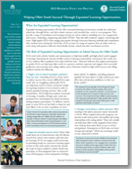The Harvard Family Research Project separated from the Harvard Graduate School of Education to become the Global Family Research Project as of January 1, 2017. It is no longer affiliated with Harvard University.

|
Number 1, August 2011 Helping Older Youth Succeed Through Expanded Learning OpportunitiesErin Harris, Sarah Deschenes, & Ashley Wallace Download a PDF of this publication (770 kb) | View all publications in this series |
Article Information
- Full Text (HTML)
- Full Text (PDF: 770 kb)
Sustaining older youth’s interest in learning is particularly critical given that nearly one in four students fails to graduate from high school on time. Research indicates that regular participation in quality expanded learning opportunities (ELOs) can help keep older youth on a positive academic trajectory and support their successful graduation and transition into college and/or career.
In this first brief in our series with the National Conference of State Legislatures, we examine the benefits of ELOs for older youth as well as the policy implications of recent research. Helping Older Youth Succeed Through Expanded Learning Opportunities provides examples of positive youth outcomes, common characteristics of high-quality programs and initiatives, and policy recommendations based on these findings.
What are expanded learning opportunities?
Expanded learning opportunities offer structured learning environments outside the traditional school day: before and after school; in summer; and through extended-day, -week, or -year programs. ELOs provide a range of enrichment and learning activities in various subjects including arts; civic engagement; and science, technology, engineering, and math (STEM). ELOs are part of a range of supports that can help youth succeed, along with positive influences from family, friends, school, and other enrichment activities.
ABOUT THIS SERIES
This series by Harvard Family Research Project and the National Conference of State Legislatures (NCSL)—a bipartisan organization that serves the legislators and staffs of the nation's 50 states, its commonwealths, and territories—addresses topics in expanded learning opportunities (ELOs). This series aims to highlight research evidence on ELO best practices and effects on youth and discuss the policy implications related to this research.

